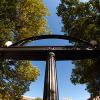UPDATE: UGA Cancels African Journalist's Speech Over Ebola Fears

Photo Credit: BrianGroen/Wikipedia.org
The University of Georgia has canceled a speech on campus this week by a Liberian journalist due to concerns about the Ebola outbreak.
Wade C.L. Williams, the editor of Front Page Africa, was scheduled to give the McGill Lecture this Wednesday. (UPDATE: Although Williams said she was giving the McGill Lecture, according to Grady College professor John Greenman, her lecture was supposed to be part of the McGill Symposium but not the McGill Lecture itself. Antonio Mora, the Peabody Award-winning host of Al Jazeera America's "Consider This," will present the actual McGill Lecture at 4 p.m. Wednesday in room 250 of the Miller Learning Center.)
Williams said she had already purchased a plane ticket and made hotel reservations when UGA told her not to come at the last minute.
“I received a call from Georgia just days before my trip. A woman with a pleasant voice delicately told me that parents were panicking and the general public was against my coming to the university,” stated Williams in a blog post published days after the university reached the decision.
Miss Williams said her feeling about the University’s decision to cancel her invitation to speak on Ebola at the University is mixed with disappointment and empathy. A lot of great people from Grady College helped me plan this trip and it took days of their effort, but what could they do when the University’s administration was pushing them to cancel?” She asked.
Continued Miss Williams: “Despite my disappointment, I’m not angry with the University of Georgia. They felt they could not wear the barrage of criticism that would be directed at them if they allowed a Liberian journalist who covers Ebola on their campus and on a U.S. soil.” She partly blamed the level of misinformation in the U.S. press that led to the University administration being paranoid and canceling what could have been a very educative lecture.
“But the hysteria in the U.S. media about the virus and the possibility of it spreading is counterproductive and must stop,” he said. “I worry that my fellow Liberians and Africans traveling abroad will be treated like pariahs and unfairly discriminated against as the region and word tries to battle this deadly virus.”
(Hat tip to Peach Pundit and the AJC.)
As Flagpole recently explained, there is very little danger of an Ebola epidemic in the U.S.
Here's the Oct. 16 news release from UGA announcing Williams' replacement Todd Frankel's visit, which does not explain why Williams was uninvited.
Todd C. Frankel, a reporter with The Washington Post, will discuss the challenges reporters face in covering the emerging Ebola crisis during a talk Oct. 23 at 4 p.m. at the University of Georgia Chapel.
The talk, “Eyewitness to Ebola: A Journalist’s Perspective,” is free and open to the public.
The original speaker for this event was Liberian journalist Wade C.L. Williams, but her visit has been postponed.
Frankel was the first reporter The Washington Post sent to West Africa to cover the outbreak. In August, Frankel spent 10 days in Sierra Leone, returning to the U.S. Sept. 1. Some of his most compelling writing includes “A virus hunter faces the big one: Ebola,” “Love in the time of Ebola,” and “The fight to save the last Ebola-free district in Sierra Leone.” A compilation of all of his stories, including several recent features about the outbreak in Texas, can be found on The Washington Post website.
Frankel is an award-winning writer earning national recognition from the National Headliners Award, American Society of Newspaper Editors and Society of Professional Journalists. His work has been anthologized in “Next Wave: America’s New Generation of Great Literary Journalists” (2012) and the “2009 Best Newspaper Writing” book. Prior to The Washington Post, Frankel worked at the St. Louis Post-Dispatch where he was on the team that was the 2009 Pulitzer Prize finalist for breaking news. For several years, he was an adjunct professor at Washington University in St. Louis. Frankel has covered major disasters and major milestones, often focusing on the overlooked story.
In addition to his public talk, Frankel and three other journalists will discuss what journalistic courage means and how it is exemplified in their work during the annual McGill Symposium at Grady College of Journalism and Mass Communication. A select group of Grady College students will meet with the journalists during that event.
The public lecture by Frankel is co-sponsored by Grady College, the Office of Academic Programs and the Center for Tropical and Emerging Global Diseases.
UPDATE: Grady Dean Charles Davis posted the following explanation to the college's website Monday.
Many people are aware that we have postponed a lecture by Liberian journalist Wade C.L. Williams previously scheduled for Thursday, Oct. 23. The reason this lecture was postponed is simple — Williams was traveling directly from Liberia to the U.S. and would have been within the 21-day monitoring period that the CDC recommends. The safety of our students is of primary concern and if the CDC suggests waiting 21 days to see if any symptoms develop, we feel it is important to heed that warning. We did not want to lose out on this educational opportunity, so we were able to secure The Washington Post journalist Todd Frankel to join us for our events this week. Frankel has covered the Ebola outbreak in Sierra Leone, but has well-surpassed the 21-day monitoring period having returned from his travels Sept. 1.
We hope you will join us for the public lecture Frankel will give as he shares his experiences Oct. 23 at 4 p.m. in the UGA Chapel. In addition to his public lecture, Frankel will also participate in a panel of journalists for the McGill Symposium with a pre-selected group of Grady College students Oct. 22. Antonio Mora, host of "Consider This" on Al Jazeera America, remains the speaker of the McGill Lecture Oct. 22 at 4 p.m. in Room #250 of the Miller Learning Center.
We look forward to inviting Williams to join us in the future so we can learn from her valuable insights.
This post has been updated to correct the location of Mora's lecture, which was in error on the Grady College's website.












comments